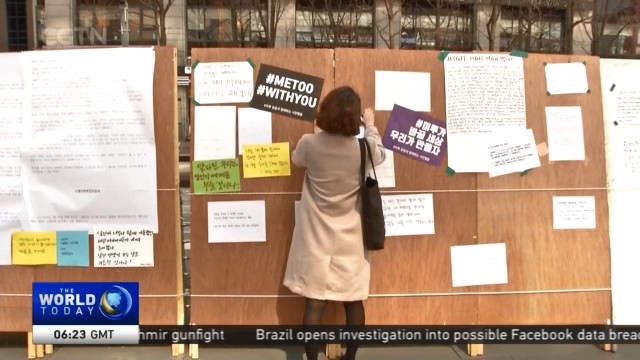
14:50, 24-Mar-2018
'METOO' Movement in S. Korea: Rally in central Seoul seeks gender equality

The "MeToo" movement has caught on in South Korea. From famous movie directors to politicians, men are being accused of sexual misconduct as testimonies from across the country spill forward. But as Joseph Kim reports, these women aren't just fighting to amend laws, but to change society.
South Korea is also saying 'Me Too'. The list of influential men accused of abusing their power is mounting, from the political realm to the entertainment world, such as famed theater director Lee Youn-taek. Actress Lee Seung-bi says she was sexually assaulted by Lee. She says, when it first happened over a decade ago, nobody bothered to help her. Now, more than a dozen others have come forward with similar stories against Lee.
LEE SEUNG-BI ACTOR "Through all of this, if we can create a world, a country, where even just a little bit, females don't have to live in fear. Where mothers who have daughters, don't have to tremble sending their girls to school. These changes. Then don't you think it'll be a better world?"
At this rally in central Seoul, women share their personal experiences of sexual harassment. This woman says, until now, she couldn't bring herself to talk about how an acquaintance molested her, feeling shameful despite being the victim. She says, "I felt so alone after it happened. I was scared and vowed to never tell anyone." And more are speaking out, demanding justice and equality.
LIM YUN-OK, STANDING-REPRESENTATIVE KOREAN WOMEN WORKERS ASSOCIATION Sexual harassment and violence are something all women in South Korean society are experiencing. So by sharing these experiences, we hope to show that this is not strictly a female problem but fundamentally, a problem that South Korean society has to change and that it's something we can change."
JOSEPH KIM SEOUL "Despite the outpour of #MeToo stories from all walks of life, protection for women is still largely absent. South Korea's justice system is still partial to offenders, predicated on the systems of patriarchy. This is even enforced in schools, where the education system teaches students that the ones responsible for these offenses weigh on the victims, failing to condemn and hold perpetrators accountable. And while the list of powerful men being called out for sexual violence grows, in a similar fashion, men are using different ways to bar women from speaking out against their assailants."
There's also been some backlash against the #MeToo movement in South Korea after an actor and professor, both accused of sexual violence, committed suicide. Though some are calling the movement a "witch hunt", in places such as the workplace, men are now shunning females. And companies are reportedly refusing to hire women in fear of more cases of sexual harassment.
KIM NANJUE, RESEARCH FELLOW KOREAN WOMEN'S DEVELOPMENT INSTITUTE "To a degree, not hiring women shows that males subconsciously have the preconceived notion they are the gatekeepers, acting in accordance to society rules. This proves that gender discrimination is rampant."
South Korea ranks in the bottom third for gender equality, according to the World Economic Forum. The country has the largest gender pay gap among advanced economies. This discrimination is why these women are saying #MeToo. They say they're ready for the country to step in the right direction, demanding complete change that recognizes their humanity. Joseph Kim, CGTN, Seoul.

SITEMAP
Copyright © 2018 CGTN. Beijing ICP prepared NO.16065310-3
Copyright © 2018 CGTN. Beijing ICP prepared NO.16065310-3